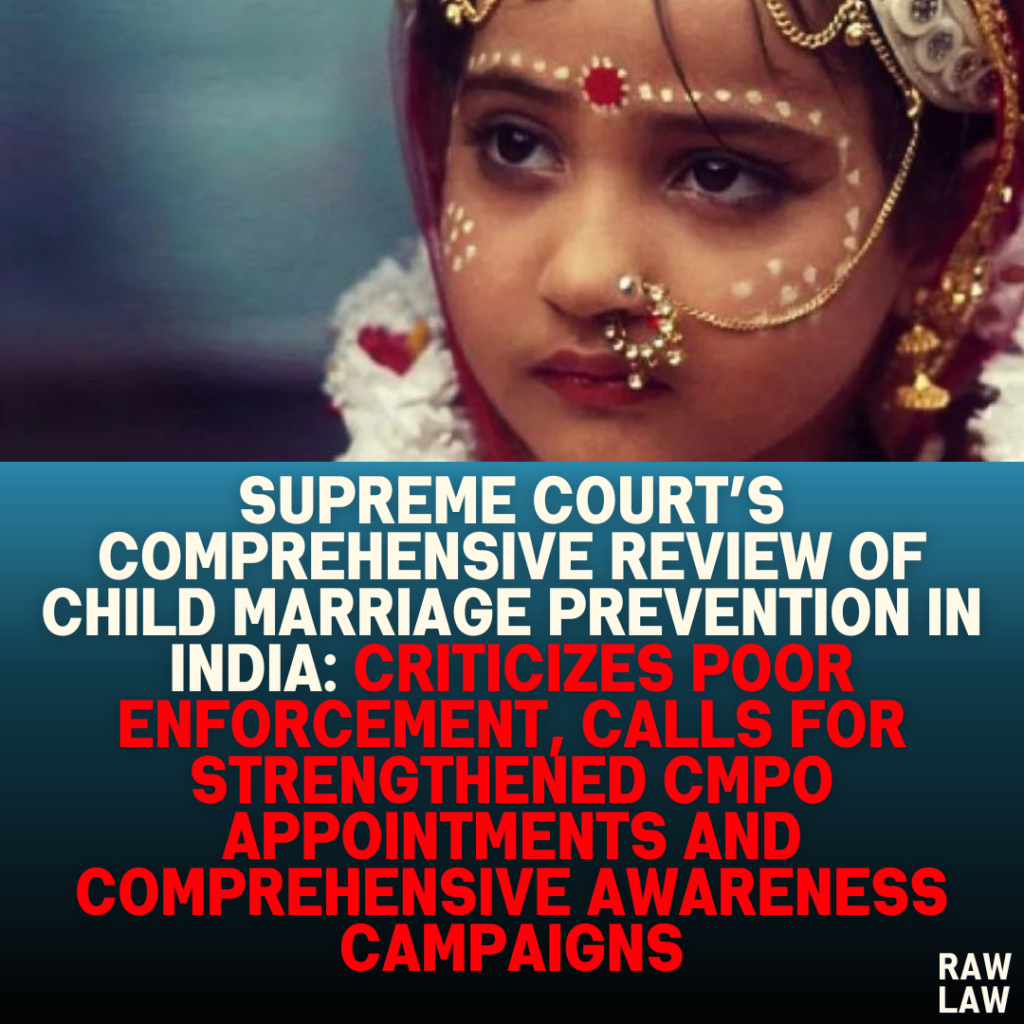Court’s Decision:
The Supreme Court has emphasized the need for stronger enforcement of the Prohibition of Child Marriage Act (PCMA), 2006, highlighting various lapses in the current framework. The Court called for comprehensive measures, including appointing Child Marriage Prohibition Officers (CMPOs), preventive measures, and broader awareness campaigns, to combat the social evil of child marriage. The Court directed the Union of India to provide a report on the progress of implementation and encouraged collaboration between authorities, NGOs, and educational institutions.
Facts:
The petitioners, a non-governmental organization working to eradicate child marriage, filed a writ petition under Article 32 of the Indian Constitution, seeking stricter enforcement of the PCMA, 2006. The petitioners argued that despite the law, child marriages remain rampant across India, with girls primarily being the victims. The petition highlighted the lack of proper enforcement mechanisms and the inadequacies in the current legal framework to curb the practice.
Issues:
- Whether the existing legal framework under the PCMA is sufficient to prevent child marriages effectively.
- Whether the appointment and functioning of CMPOs are in compliance with statutory obligations.
- What additional measures can be implemented to ensure the prevention of child marriages.
Petitioner’s Arguments:
- The petitioners contended that despite the enactment of the PCMA, 2006, child marriage continues at an alarming rate due to poor enforcement of the law.
- They argued that CMPOs, as mandated by the PCMA, are often tasked with multiple responsibilities, rendering them ineffective in preventing child marriages.
- The petitioners highlighted disparities in the appointment of CMPOs across states, with several states failing to appoint full-time officers or provide adequate resources.
Respondent’s Arguments:
- The Union of India acknowledged that child marriages persist due to societal pressures, economic constraints, and gender inequality.
- It was argued that the Beti Bachao Beti Padhao initiative and other social schemes aim to combat gender bias and promote girls’ education, thereby indirectly addressing the root causes of child marriage.
- The government submitted data showing a decline in child marriage rates but conceded that progress must be accelerated to meet international targets, including the Sustainable Development Goals (SDGs).
Analysis of the Law:
The Court analyzed the provisions of the PCMA, which criminalizes child marriages and prescribes punishments for individuals facilitating, solemnizing, or permitting child marriages. The Court noted that while the legal framework under the PCMA addresses punitive measures, it lacks comprehensive preventive mechanisms, particularly in the enforcement and appointment of CMPOs.
Precedent Analysis:
The Court referred to past judgments on child protection and women’s rights, emphasizing the importance of upholding human dignity and preventing exploitation. Notably, the Court referenced judgments that recognized the need for special care and protection for vulnerable groups, including minors, in the context of forced or early marriages.
Court’s Reasoning:
The Court observed that child marriage is not only a violation of the law but also a fundamental breach of the rights of children, particularly girls. It criticized the failure of authorities to prioritize the appointment and functioning of CMPOs, leading to poor enforcement of the PCMA. The Court also stressed the importance of community involvement, education, and awareness in preventing child marriages.
Conclusion:
The Court directed the Union Government to submit a detailed report on the implementation of the PCMA across states, with a specific focus on the appointment and functioning of CMPOs. The Court also urged the government to collaborate with NGOs, initiate awareness campaigns, and incorporate child marriage prevention in school curricula.
Implications:
The judgment has significant implications for child protection laws in India. It underscores the need for a multi-faceted approach, including stricter law enforcement, community engagement, and educational reform, to eradicate child marriage. The ruling also highlights the importance of accountability at the state and central government levels to ensure the welfare of children.




Pingback: Delhi High Court Issues Permanent Injunction Against Unauthorized Use of 'DREAM11' Trademarks, Citing Tarnished Goodwill Due to Gambling Site - Raw Law